Manalapan
(732) 845-0100
Manalapan (732) 845-0100
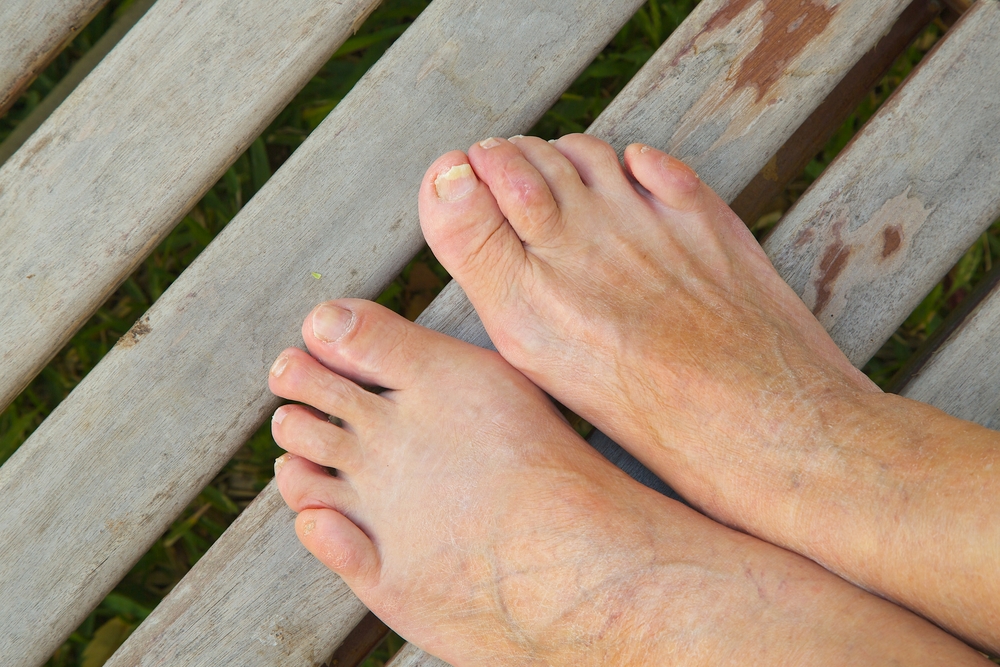
A hammertoe is a significantly unsightly affliction of the foot that can develop when the joint of a toe points upward at the middle of a toe. The toe can end up looking like a kind of hammer, which is why the condition is called hammertoe. One important thing to note about the condition of hammertoe is that it can be especially influenced by the kind of shoes that someone wears. For example, when someone wears high-heeled shoes, their toes can become pressed up against the tip of the shoe, essentially squishing the toes in the toe box. This does not bode well for the development of hammertoe. Also, other kinds of shoes simply do not fit correctly, perhaps because they are too tight and can ultimately squish the toes in the toe box. In this way, tight shoes and high heeled shoes might lead to conditions like hammertoe. Reach out to a podiatrist today for more information.
Hammertoe
Hammertoes can be a painful condition to live with. For more information, contact Dr. Charles Marchese from Manalapan Foot & Ankle. Our doctor will answer any of your foot- and ankle-related questions.
Hammertoe is a foot deformity that affects the joints of the second, third, fourth, or fifth toes of your feet. It is a painful foot condition in which these toes curl and arch up, which can often lead to pain when wearing footwear.
Symptoms
Causes
Genetics – People who are genetically predisposed to hammertoe are often more susceptible
Arthritis – Because arthritis affects the joints in your toes, further deformities stemming from arthritis can occur
Trauma – Direct trauma to the toes could potentially lead to hammertoe
Ill-fitting shoes – Undue pressure on the front of the toes from ill-fitting shoes can potentially lead to the development of hammertoe
Treatment
Orthotics – Custom made inserts can be used to help relieve pressure placed on the toes and therefore relieve some of the pain associated with it
Medications – Oral medications such as anti-inflammatories or NSAIDs could be used to treat the pain and inflammation hammertoes causes. Injections of corticosteroids are also sometimes used
Surgery – In more severe cases where the hammertoes have become more rigid, foot surgery is a potential option
If you have any questions please contact our offices located in Manalapan, NJ, and Staten Island, NY . We offer the newest diagnostic and treatment technologies for all your foot and ankle needs.
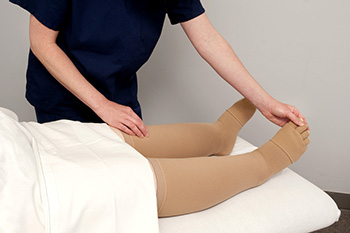
Edema or swelling in the ankles and feet can be an inconvenience or cause severe discomfort and pain. Ways to alleviate edema include continuing to move the affected body parts and elevate the legs above the heart, massaging the swollen areas to push the retained fluid out, and wearing compression socks to facilitate blood flow. The goal of these things is to pump excess fluid back to the heart. Reducing salt intake and dropping extra weight if one is overweight can also help or prevent edema. If the things you try on your own do not relieve the swelling or if the swelling gets worse, it is important that you consult with a podiatrist to find out what is causing the problem and how it can be fixed.
Swollen feet can be a sign of an underlying condition. If you have any concerns, contact Dr. Charles Marchese of Manalapan Foot & Ankle. Our doctor can provide the care you need to keep you pain-free and on your feet.
Swollen feet are a common ailment among pregnant women and people who stand or sit for extended periods. Aging may increase the possibility of swollen feet and patients who are obese often notice when their feet are swelling too. There may be medical reasons why swollen feet occur:
Swollen feet can also be caused by bone and tendon conditions, including fractures, arthritis, and tendinitis. Additionally, there may be skin and toenail conditions and an infection may cause the feet to swell. Patients who take medicine to treat high blood pressure may be prone to getting swollen feet.
Many patients elevate their feet to help relieve the swelling and this is generally a temporary remedy. When a podiatrist is consulted the reason behind the swelling can be uncovered and subsequently treated.
If you have any questions please feel free to contact our offices located in Manalapan, NJ, and Staten Island, NY . We offer the newest diagnostic tools and technology to treat your foot and ankle needs.
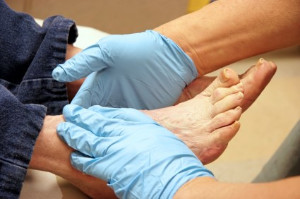
Charcot foot is a rare, but serious, complication of peripheral neuropathy brought on by diabetes. It affects the bones, joints, and soft tissues of the foot and ankle. Weakened joints can cause the bones to break and joints to dislocate. As a result, the shape of the foot changes. Charcot foot is deceptive and can be hard to diagnose, because symptoms include redness, hotness, and swelling. Because of that, it is often thought to be an infection. Although specific causes for Charcot foot are not clear, some conditions may help to indicate it. Often, because a diabetic with peripheral neuropathy cannot feel pain, a sprain or even a fracture can go unnoticed. In some cases, the foot becomes rounded on the bottom because the arch has collapsed. This also may indicate Charcot foot. Treatment varies from staying off the affected foot to surgery. People with Charcot foot may need to wear protective footwear, such as a cast, on a regular basis. If you suffer from diabetes and have developed peripheral neuropathy, it is highly recommended that you consult a podiatrist on a regular basis to monitor any unnoticed injuries that may indicate Charcot foot.
Diabetic foot care is important in preventing foot ailments such as ulcers. If you are suffering from diabetes or have any other concerns about your feet, contact Dr. Charles Marchese from Manalapan Foot & Ankle. Our doctor can provide the care you need to keep you pain-free and on your feet.
Diabetic Foot Care
Diabetes affects millions of people every year. The condition can damage blood vessels in many parts of the body, especially the feet. Because of this, taking care of your feet is essential if you have diabetes, and having a podiatrist help monitor your foot health is highly recommended.
The Importance of Caring for Your Feet
Patients with diabetes should have their doctor monitor their blood levels, as blood sugar levels play such a huge role in diabetic care. Monitoring these levels on a regular basis is highly advised.
It is always best to inform your healthcare professional of any concerns you may have regarding your feet, especially for diabetic patients. Early treatment and routine foot examinations are keys to maintaining proper health, especially because severe complications can arise if proper treatment is not applied.
If you have any questions please feel free to contact our offices located in Manalapan, NJ, and Staten Island, NY . We offer the newest diagnostic and treatment technologies for all your foot and ankle needs.
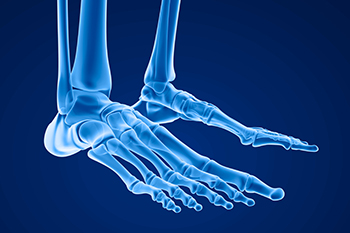
Like other important parts of the human body, the feet are exceedingly intricate and have many different bones that each serve critical purposes. The talus bone is one example. The talus is situated near the top area of the foot, comprising an important part of the ankle. Technically, it is one of the seven different tarsal bones. Not only does this bone help hold the body’s weight, but it is also made up of four different main parts. First, the talus has a head, a dome, a posterior facet, and an anterior facet. It is imperative that one takes extra special care of the talus, as this essential bone can become fractured if twisted near the ankle. If you have foot pain and to learn more about this important bone, contact a podiatrist.
If you have any concerns about your feet, contact Dr. Charles Marchese from Manalapan Foot & Ankle. Our doctor can provide the care you need to keep you pain-free and on your feet.
Biomechanics in Podiatry
Podiatric biomechanics is a particular sector of specialty podiatry with licensed practitioners who are trained to diagnose and treat conditions affecting the foot, ankle and lower leg. Biomechanics deals with the forces that act against the body, causing an interference with the biological structures. It focuses on the movement of the ankle, the foot and the forces that interact with them.
A History of Biomechanics
Modern technological improvements are based on past theories and therapeutic processes that provide a better understanding of podiatric concepts for biomechanics. Computers can provide accurate information about the forces and patterns of the feet and lower legs.
Understanding biomechanics of the feet can help improve and eliminate pain, stopping further stress to the foot.
If you have any questions please feel free to contact our offices located in Manalapan, NJ, and Staten Island, NY . We offer the newest diagnostic and treatment technologies for all your foot and ankle needs.
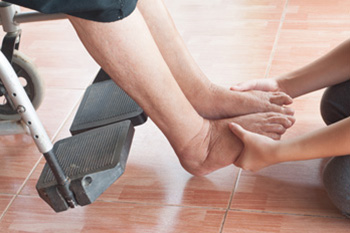
The feet are the foundation of our bodies and overall health. If you help an elderly person care for their feet, some steps can be implemented to help achieve this goal. These steps include washing, drying, and moisturizing their feet daily, followed by a thorough examination. It is also important to trim the toenails properly, straight across, and not too short. If something does not look, feel, or smell properly, it is best to consult a podiatrist. Of particular significance is if the senior has a cut or wound that does appear to be healing. This can even be more serious if the person is diabetic. It is strongly suggested that you contact a podiatrist who is an expert in the diagnosis, treatment, and prevention of any issues involving the feet.
Proper foot care is something many older adults forget to consider. If you have any concerns about your feet and ankles, contact Dr. Charles Marchese from Manalapan Foot & Ankle. Our doctor can provide the care you need to keep you pain-free and on your feet.
The Elderly and Their Feet
As we age we start to notice many changes in our body, but the elder population may not notice them right away. Medical conditions may prevent the elderly to take notice of their foot health right away. Poor vision is a lead contributor to not taking action for the elderly.
Common Conditions
Susceptible Infections
Diabetes and poor circulation can cause general loss of sensitivity over the years, turning a simple cut into a serious issue.
If you have any questions please feel free to contact our offices located in Manalapan, NJ, and Staten Island, NY . We offer the newest diagnostic and treatment technologies for all your foot and ankle needs.